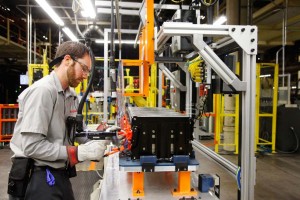Nissan took a major step toward U.S. production of its Leaf electric vehicle with the beginning of lithium-ion battery production in at its plant in Smyrna, Tenn.
Smyrna is the third location for production of Leaf batteries. The new battery facility is located right alongside a new assembly line that will shortly begin producing the Leaf itself for the U.S. and other markets
“Opening this U.S. plant is an important milestone in Nissan’s overarching strategy to foster sustainable mobility around the world,” said Carlos Ghosn, Nissan president and chief executive officer. “The opening of this facility in Tennessee supports our goal of making zero-emissions mobility a reality through American jobs and American manufacturing.”
Nissan continues to bet big on the Leaf, even though sales have been disappointing for the first two years. Sales sagged markedly during the first 10 months of 2012, though demand largely recovered during November.
Nonetheless, Nissan has delivered only about 18,000 Leafs in the U.S. and more than 46,000 worldwide, well below projections.
“Nissan is the zero-emissions vehicle leader, and we are making significant strides as one of the largest producers of electric vehicles and batteries in the United States,” Ghosn said.
Nissan has invested $1.7 billion in the battery plant and tooling to produce the Leaf in Smyrna. Nissan obtained a federally guaranteed $1.4 billion loan to help fund the project. So far, Nissan has added 300 jobs between battery production and setting up for production of the vehicle itself. That number could rise to 1,000 jobs depending on production demands. The battery plant was built to accommodate expansion to produce up to 200,000 battery modules.
The automaker believes Leaf sales will go up with U.S. production.
Nissan will build the Leaf on the same production line as the Altima and Maxima sedans, which will allow it to quickly respond to capacity demands. The Leaf it produces in Smyrna will have technological advances and changes in features, although Nissan has not provided details.
The recent growth of Nissan’s U.S. manufacturing plants is part of a strategy to localize core-model production. By 2015, Nissan aims to have 85 percent of all Nissan and Infiniti products that are sold in the United States produced in North America.
The loan was issued as part of the Advanced Technology Vehicles Manufacturing Loan Program, program authorized by Congress as part of the Energy Independence and Security Act of 2007. The program is designed to accelerate the development of vehicles and technologies that increase U.S. energy independence, create cleaner means of transportation and stimulate the American economy.

